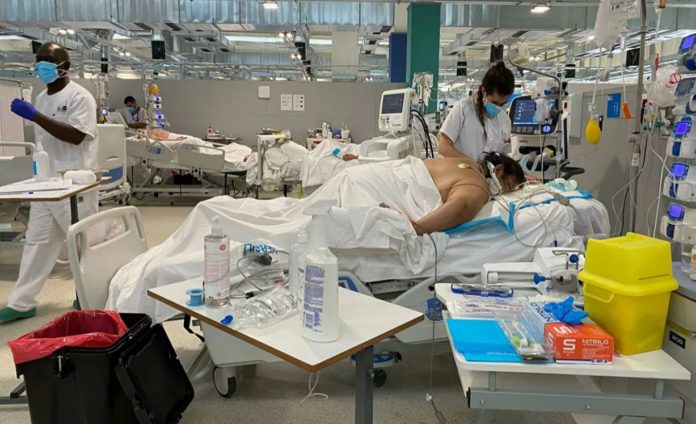Until now, the benefits of prone positioning were known in patients who were intubated in Intensive Care Units, but there was no scientific evidence of its efficacy in those patients who were not intubated.
The prone position improves the outcome of patients requiring high-flow oxygen therapy, which is applied when a severe respiratory failure occurs.
The study, published on Tuesday in The Lancet Respiratory Medicine journal, is the first major research to analyze the benefits of this change in position and opens the door to a change in current clinical practice to incorporate this treatment as part of the medical routine for non-intubated patients with COVID-19.
The majority of Spanish ICUs applied the technique to patients with Acute Respiratory Distress Syndrome.
Now, the international study, coordinated by Tours Hospital in France and involving the Vall d’Hebron and Hospital del Mar in Barcelona, offers empirical corroboration for what many ICU specialists had already put into practice: that laying a patient prone while administering high flow oxygen therapy improves their outlook.
“The scientific evidence that this technique in non-intubated patients is especially important during peaks in the pandemic, when there may be a shortage of ventilators,” Dr Oriol Roca, ICU medical coordinator at the Hospital Vall d’Hebron, said.
“This is the first big investigation that looks at the benefits of changing the position of a patient who is awake and does not need a ventilator — that is to say that they breathe by themselves — as part of treatment for Covid-19,” he added.
The study involved 1,126 hospital patients between April 2020 and January 2021.
Half of those patients, the control group, were treated under regular protocol while the other, experimental group, were put in prone for, on average, five hours a day.
Researchers observed that in the control group, some 46% of the patients required intubation or died within a window of 28 days.
In the experimental group, 40% of the experimental group faced the same outcome.
The study also demonstrated that those who were laid in a prone position for an initial daily session of three hours on average fared better when returned to their back.
Image Credit: GEtty
